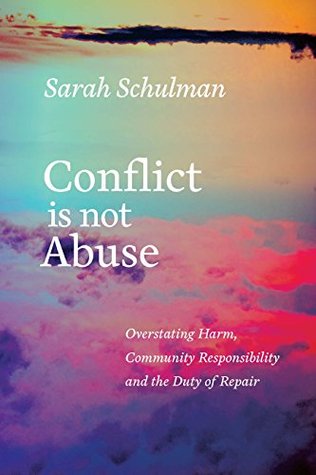More on this book
Community
Kindle Notes & Highlights
Read between
August 21 - September 14, 2024
If a person cannot solve a conflict with a friend, how can they possibly contribute to larger efforts for peace? If we refuse to speak to a friend because we project our anxieties onto an email they wrote, how are we going to welcome refugees, immigrants, and the homeless into our communities? The values required for social repair are the same values required for personal repair. And so this discussion must begin in the most micro experience. Confusing being mortal with being threatened can occur in any realm. The fact that something could go wrong does not mean that we are in danger. It means
...more
Experiencing anxiety does not mean that anyone is doing anything to us that is unjust.
Being accused of desire is as old as history itself, and is central to the queer experience. It has been very, very dangerous. Both seeing and imagining queer desire in another has and can cost us our lives, our homes, our families, and employment. We have been excluded, shunned, imprisoned, and murdered for knowing or believing that desire is reciprocated. Sex workers, especially trans women, often lose their lives expressly because they were desired. And certainly “homosexual panic defense” has been used successfully in courts to justify the murders of gay men, perhaps gay men who had
...more
The refusal to actually ask someone what they think is happening and to instead insist on unilateral interpretations compounds misunderstanding and then injustice.
Queers have been taught all our lives that erotic feeling is wrong and that it will subject us to ridicule, exclusion, and punishment. People who feel erotically towards forbidden objects—like those other than partners to whom they have pledged monogamy, or those who are the wrong age, who work in the same sexually prohibitive workplace, who are transgender, or sex workers, who are generally desexualized by the dominant culture, or who are “off-type” (as in not as butch as one’s femme identity demands in a partner)—can motivate them to hide feelings, even to themselves. Telling the truth of
...more
Part of peace-making is acknowledging that we can’t know everything about ourselves, and sometimes we reveal things to others that we are not ready to accept.
I say, let’s get back to the first one hundred years of telephone culture, where people looked up each other’s numbers and called. The now “forbidden” ten-to-twenty-minute phone conversation could save the subsequent months or years of misplaced bad feeling. All this terrible loss, for nothing.
“Differentiating between Power Struggle and Power Over,” Hodes explained, “is the difference between Conflict and Abuse.” Abuse is Power Over and Conflict is Power Struggle.
Accusations of Abuse, when it is in fact Conflict, can be a smokescreen, obscuring the real problems at hand and making effective response difficult.
The National Coalition of Anti-Violence Programs’ 2014 report on LGBTQI Intimate Partner Abuse noted that “in 2013 the police mis-arrested the survivor as the perpetrator of violence” in over half of all queer domestic abuse arrests. There are particular dangers in misidentifying the perpetrator in same-sex relationships. The one who is butch, of color, not a mother, not a citizen, is from another culture, or HIV-positive can be falsely construed as the assailant.


